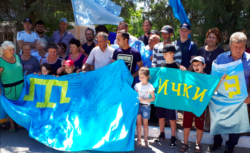The Way Home: Crimean Tatars and the Struggle for Survival

Source: Kharkiv Human Rights Protection Group
By Eban Raymond
On 24th February 2022, the world awoke to the largest military invasion in Europe since the end of Second World War some 70 years prior. The public were exposed to videos and images of tanks rolling across fields, bombed-out nurseries, and cities aflame; overnight, sympathy and support for the Ukrainian people swept social media. Fast forward to the present day, and the war is treated as just another occurrence in international affairs, consigned to the back of people’s minds.
Amidst the attention rightly given to the Ukrainian struggle, however, there exists a group that continue their own fight for survival. For the indigenous people of Crimea, the Crimean Tatars, the invasion of Ukraine marks another bloody phase on the road to freedom. From genocide and denial of identity, to forced military enlistment, the wounds run deep.
To understand their story, we must traverse the last few centuries. In what is now Southern Ukraine, was a state known as the Crimean Khanate, with most of the population being Crimean Tatars, a Turkic ethnic group. This state was a nominal vassal state of the Ottoman Empire and was annexed by the Russian Empire in 17831. Thus began a lengthy period of Russian persecution of the populace, based on differences of language and culture. Over the centuries, various conflicts including the Crimean War of 1853 and First World War triggered waves of further persecution, culminating in forced emigration that took thousands of lives.2
Through increasing recognition of the Ukrainian Terror-Famine of 1932-33 as an attempted genocide, so too are the forced mass deportations of Crimean Tatars to Central Asia by Stalin in 19433. Facing complete destruction, the Crimean Tatars were forced to abandon their homeland and between 20-40% of the entire population are estimated to have died on the forced marches. Ethnic Russians, Ukrainians and Belarusians were sent to repopulate their former home, permanently altering the ethnic make-up in the region to wipe away any trace of habitation.
The battle has since continued. Following the independence of Ukraine in 1991, the Ukrainian government authorised the repatriation of 200,000 Crimean Tatars to Crimea, beginning the first stage of re-confirming their cultural identity that had been denied for decades.
The most turbulent events have occurred in living memory After the Russian annexation of Crimea in 2014, the Crimean Tatars were once again threatened. A few human rights activists campaigning for recognition and autonomy were imprisoned by Russian state security and the representative body, Mejilis, was outlawed for alleged terrorism.
Return to the present day and the invasion of Ukraine marks yet another attempt at genocide, aimed at more than one group. Vladimir Putin’s ‘partial mobilisation’ in September 2022 has been internationally decried as forced service, but also a further attempt at ethnic cleansing across the nation. Minorities within Russia have been disproportionately pressed into service, forced to fight and die in droves; the Crimean Tatars are no exception. It is estimated that around 90% of Crimean Tatars within Crimea have received mobilisation notices, a move that has been condemned by Ukrainian President Volodomyr Zelensky as a move to eliminate the Crimean Tatar nation completely.
Beyond simply accepting current circumstances, the Crimean Tatars have begun to mobilise themselves in defence of their community. From military service in the Ukrainian Armed Forces to widespread support from the Tatar diaspora, efforts are being made to preserve their identity in a battle that has been raging for centuries.
Evidently, the struggle ahead will be difficult as the war will continue for the foreseeable future. Above all, the struggle of the Crimean Tatars to secure an independent future is one deeply intertwined with many others, from the Rohingya in Myanmar to Bashkirs in the Urals, and beyond. It also serves as a reminder that Vladimir Putin cannot be allowed to continue his neo-imperialist ambitions. It is a warning that passivity is complicity. Only once the war is over will the Crimean Tatars finally be able to secure the future they so deserve.
